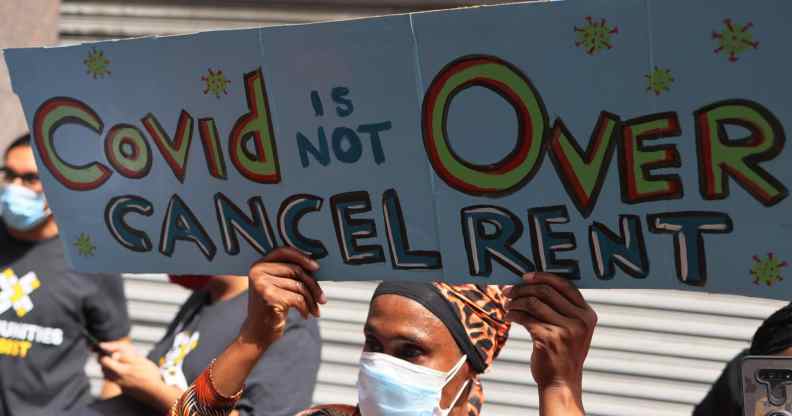Half of LGBT+ people behind on rent fear eviction in next two months, report says

Protestors calling for a stop to evictions in New York City on 31 August 2021 (Michael M. Santiago/Getty)
Almost a fifth of LGBT+ Americans are behind on their rent and nearly half of those fear eviction within the next two months, a new report has found.
The concerning research on rental housing stability was published by the UCLA’s Williams Institute a week after the US Supreme Court struck down an extended eviction moratorium.
The think tank analysed data from the Census Bureau’s Household Pulse Survey, which collected information from individuals during the current COVID-19 pandemic.
The data showed that LGBT+ people are significantly more likely to be renters, with 41 per cent of queer respondents saying they rented their homes compared to 25 per cent of their straight, cisgender counterparts.
Of that number, 19 per cent of LGBT+ renters reported not being caught up on rent, compared to 14 per cent of straight renters, and 47 per cent of queer renters who are behind on payments said they feared eviction in the next two months, compared to 46 per cent of straight ones.
The situation has been markedly worsened by the pandemic’s hit to the economy, especially in the service sector where many LGBT+ people work.
Whether a person rents or owns their home is a major factor in housing instability, the think tank concluded, and LGBT+ people of colour are faring the worst as they’re more likely to be renters and not homeowners, and more likely to be behind on rent compared to all other groups.
“A key component to a person’s housing stability is whether they own or rent,” lead author Bianca DM Wilson, senior scholar of public policy at the Williams Institute, said in a statement.
“The COVID-19 pandemic has only exacerbated the risk that LGBT people – and LGBT people of colour in particular – will lose their housing as federal eviction protections are set to expire in October.”
The Supreme Court struck down those protections last week in a 6-3 opinion that said the Centres for Disease Control and Prevention exceeded its authority, and that Congress would have to authorise the moratorium.
Evictions can now resume unless a state or local jurisdiction has implemented its own moratorium.
Six states – California, Minnesota, New Jersey, New Mexico, New York and Washington – and the District of Columbia have their own moratoriums in effect that aren’t affected by the Supreme Court’s decision.

